The Dockers leave the ground after (left) their Round 11 win over Melbourne and (right) the GWS loss last week.
Fremantle goes into Saturday night’s game against Essendon a $1.71 favourite, and not for the first time when it comes to the Dockers, posing questions about reputation and reality.
The game is in Perth, an obvious factor in that favouritism, as might be the fact Essendon will be coming off a bye, a position from which five out of six teams so far this season already have lost. And as one of those five, the Dockers know all about that one.
It’s been a sobering few weeks for Fremantle, which headed into its break having won four games in a row and having just knocked over Melbourne at the MCG, only to lose straight after it at home to a then out-of-sorts Richmond, then last week by a whopping 70 points to GWS, the heaviest defeat in Justin Longmuir’s 76 games as Fremantle coach.
Should Fremantle even be starting favourite? Essendon is currently sixth on the AFL to the Dockers’ 13th, with two more wins having both played 13games. The Bombers have, like Freo heading into its bye, strung together four victories on the trot. Essendon’s list is fractionally older and more experienced than the Dockers, too.
Saturday night’s clash is crucial, but indeed so is the rest of the season in answering a fundamental question about the home side. And that’s just what is the “real” Fremantle? A talented and emerging team underperforming thus far in 2023, or an average at best list without much scope for improvement? There are valid arguments in either direction.
It’s easy to assume the Dockers are an older playing group than they actually are given the continued discussion around old heads Nat Fyfe and Michael Walters, and the presence of a young veteran like Andrew Brayshaw, now in his sixth AFL season and with 113 games under his belt.
Fremantle, however, is in fact the third least-experienced playing group in the competition, ahead only of Hawthorn and Adelaide.
That should in itself keep something of a lid on expectations, and yet in the goldfish bowl environment of the WA football world, discussion about the Dockers both as a team and of its players individually often seems based on a premise that this is a top team. And that’s a premise with which I’m not sure I agree.
There are Fremantle players barely recognisable in these Melbourne-based parts who can nonetheless command enormous amounts of public attention at home.
The goldfish bowl that is the Western Australian football community discussed at length this week the ramifications of the recent absence of ruckman Sean Darcy. That’s entirely legitimate, too, given his ruck talents and importance to the Dockers structurally.
PLEASE HELP US CONTINUE TO THRIVE BY BECOMING AN OFFICIAL FOOTYOLOGY PATRON. JUST CLICK THIS LINK.
There was also, however, references to the Dockers’ “big names on long-term deals”, a list which included names such as Michael Frederick, Hayden Young and Heath Chapman.
Big names? With all due respect, that trio, which has only scraped together just on 120 games between them, could walk buck naked down Flinders Street and barely turn a single head. Ditto another couple in Liam Henry and Nathan O’Driscoll who seem to be the subject of much analysis relative to their combined career output thus far.
Then there’s the more experienced types who remain part of the equation without necessarily having done a lot to make themselves indispensable.
Injuries have generally been a common denominator in these cases, Sam Switkowski, for example, now in his fifth season but having tallied just 58 games, and the most obvious example key forward Matt Taberner. But just when is the tipping point at which losses should be cut?
Taberner turned 30 last weekend and is in his 11th season for a grand tally of just 120 games. They’re numbers which keep Fremantle’s average age up, and its average games experience for that age lower. And they’re not the directions in which you want those two indicators headed.
To that end, Nat Fyfe and Michael Walters, as superb as both have been for Fremantle over the years, and as indispensable as they actually have proved, shouldn’t be even the necessary cream on the cake they still seem to be if the Dockers are going to be any more than token finalists again.
And that’s what they were in 2022, despite a first-up home final win over the Western Bulldogs and relatively honourable semi-final defeat away against Collingwood.
This year, Fremantle doesn’t even look that. Correction, it didn’t early, did for a month during which, in a row, it defeated Sydney, Geelong and Melbourne, then undid all that good work with a lazy-looking return from the bye round.
At this stage last season, the Dockers were third on the ladder at 10-3, equal on points with the top two. They weren’t a heavy-scoring team, but supreme defensively, ranked second for fewest points conceded after winning that category in 2021.
Currently, to the same stage, Fremantle has won four fewer games. The Dockers rank a dismal 14th for points scored compared to last year’s 12th, and are 13th for fewest points conceded.
We often hear about improvement not being linear. But these are massive and stark drop-offs. Are they the sign of a side just having “one of those years” with normal transmission to resume at some stage? Or is this just them? On Saturday night, the finding out begins.
This article first appeared at ESPN.

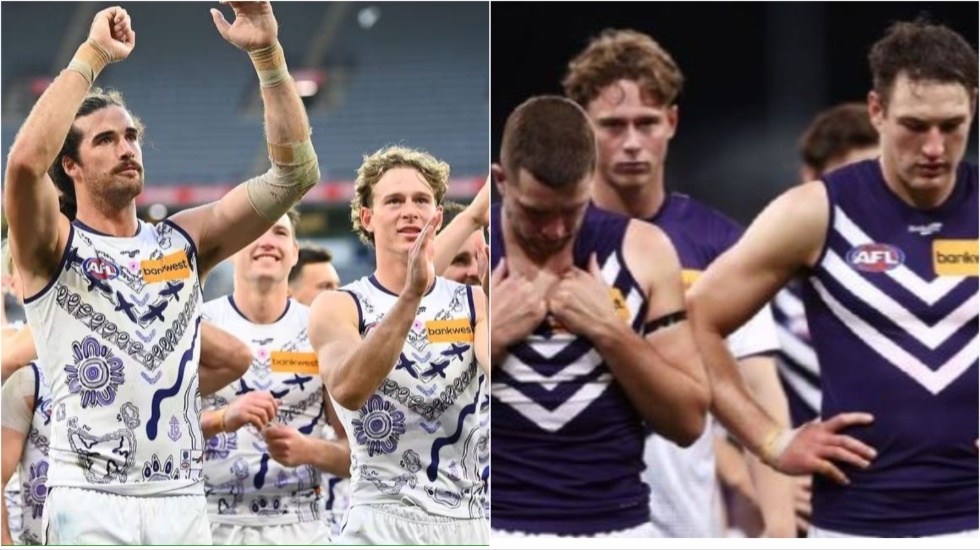
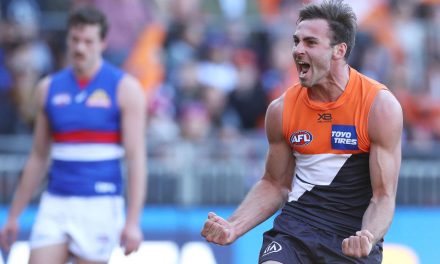
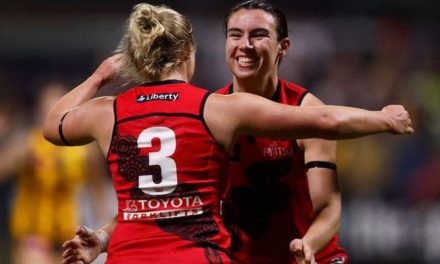
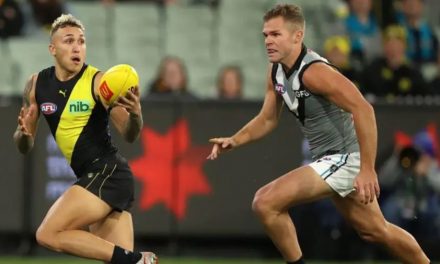
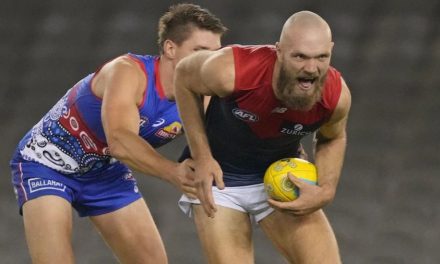






Freo have signed up a bunch of young players on 3-4 year contracts, (most of them 1st round draft picks) because they want them to stay – which is just good list management, but I don’t hear anyone here referring to them as “big names” yet. Maybe you read or heard it somewhere and it stuck, but I live in Perth and I don’t see or hear that kind of hype, even with the expectation that local media would focus on the two local teams. Even if they did, it would only be to balance the lack of coverage elsewhere. Watch a show like Footy Classified and you have be going remarkably awful or be at the top of the ladder as an interstate team to get a single mention in an hour of football talk.
There are some fairly lazy journalists that make a living out of football that can’t be bothered to study opposition teams they don’t care much about or learn more than a handful of the names of players on that team – just as there are commentators who see a player and say “He’s having a great season” (Luke Darcy on Saturday night in the Freo vs Ess game said this about a few Dockers players who haven’t. Gerard Healy is another that tosses hosannas out at random to players who have hardly had a touch and suddenly when they get a touch its:- “he’s one of their barometers and right now he’s having a big impact”)
The only up and coming stars worthy of mentioning at Freo relative to other good players in the competition are Brayshaw, Serong and Darcy. Hayden Young maybe getting there and perhaps Jye Amiss should be in conversation as of the top contenders for this years’ rising star but his 25 goals so far this season as a 19yo KPF would be more hype if he played in Melbourne.
Of the players you mentioned, Frederick may have some fleeting notoriety because his “flip” in the Western Derby got a bit of coverage. Chapman has been injured most of the season and Switkowski has had an injury plague career. Henry and O’Driscoll are in and out of the side as wingmen, and may be vying for the same position. Below them there’s a couple of top 10 picks in Johnson and Erasmus who aren’t quite at the AFL level yet.
I get that the Flinders St line is probably for comic effect but its rubbish. Walk any team down the main street of another AFL city and they wouldn’t be recognized. Now Essendon are in town do you reckon anyone in Hay St would have a clue about Zerk-Thatcher, Durham, Snelling, Menzie, Laverde, Weideman or even Guelfi and Martin who come from Perth. Doubt it! Only fans of clubs would know their team that well.
Some very reasonable points there, Alex. Thanks for reading it and for the interest.
Cheers,
Rohan